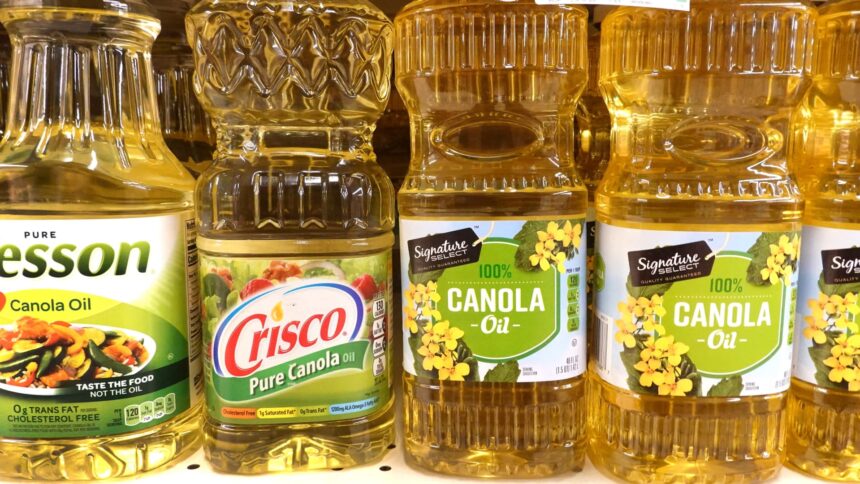Canadian canola cooking oil is offered for sale at a grocery store on April 26, 2022 in Chicago, Illinois.
Scott Olson Getty Images
China said on Tuesday it plans to launch an anti-dumping investigation into canola imports from Canada, after Ottawa moved to impose tariffs on Chinese electric vehicles, raising prices of domestic rapeseed oil futures to a peak of one month.
Canadian Agriculture Minister Lawrence MacAulay said the move was “deeply troubling.” In a post on the X social media network, he said that Ottawa is following the case and will defend and support the agricultural sector.
Canada, following the lead of the United States and the European Union, announced last week a 100% tariff on Chinese electric vehicle imports and a 25% tariff on steel and aluminum imported from China.
“China strongly deplores and strongly opposes the discriminatory unilateral restrictive measures taken by Canada against imports from China despite opposition and dissuasion from many parties,” a trade ministry spokesman said in a statement.
The ministry said China would also launch an anti-dumping investigation into some Canadian chemical products.
More than half of the canola produced in Canada goes to China, the world’s largest oilseed importer. Canola, also called rapeseed for certain variants, is used as cooking oil and in various products including renewable fuel.
The Canola Board of Canada says it hopes the Chinese investigation will show Canadian producers are playing by the rules. In a statement, it said Canadian canola exports to China last year amounted to CA$5.0 billion ($3.7 billion).

China’s rapeseed meal futures on the Zhengzhou Commodity Exchange jumped 6% to 2,375 yuan ($333.56) per metric ton after the announcement, hitting the highest since Aug. 6.
The ICE canola contract for November delivery fell to the daily limit by $45, or 7%, to $569.7 per metric ton.
“Canada’s canola exports to China are growing and are expected to reach $3.47 billion in 2023, with volumes increasing by 170% annually and continued price declines,” the ministry said.
“Influenced by unfair competition on the Canadian side, China’s domestic rapeseed-related industry continues to experience losses,” he said.
China’s rapeseed meal prices have fallen 22% so far this year as oilseed supplies are plentiful and domestic production rises.
“Domestic consumption (of treated oil) is weak now, and there is a lot of domestic inventory,” said Ma Wenfeng, a senior analyst at Beijing-based agricultural consultancy Beijing Orient Agribusiness Consultancy.
China imports canola mainly from Canada, followed by Russia and Mongolia.
“Arrivals from Canada are growing rapidly,” Ma said.
The world’s second largest economy will import 5.5 million tons of canola in 2023, worth $3.72 billion. Imports from Canada accounted for 94% of the total.
Comparatively, most of China’s electric vehicle exports to Canada come from the Tesla factory in Shanghai and local Chinese companies do not yet have a large exposure to the export market.
Canada’s car imports from China to its largest port, Vancouver, are expected to grow 460% annually to 44,356 in 2023, as Tesla begins shipping Shanghai-made EVs to Canada.
A Chinese spokesperson said it intends to use the World Trade Organization’s dispute settlement mechanism for relevant practices in Canada.
China has also launched a trade investigation into imports of pork, brandy and milk from the European Union in response to curbs on electric vehicle exports.
China has targeted Canadian canola in previous trade tensions. In 2019, it suspended two Canadian canola exporters before lifting the ban three years later.
Analysts say China may turn to Australia and Ukraine for alternative supplies, particularly as Australia’s canola production is substantial.
Canola production in Europe was affected by bad weather while China’s agricultural trade with Ukraine was limited.
“We expect China to buy larger volumes from Australia if the ban on Australian canola is eased,” said Ole Houe, director of advisory services at IKON Commodities in Sydney.
“Currently Australian canola exports to China are not viable, only around 500 tonnes from the start of 2024,” Houe said.
Chinese imports of Australian canola have been restricted due to concerns about blackleg disease.




